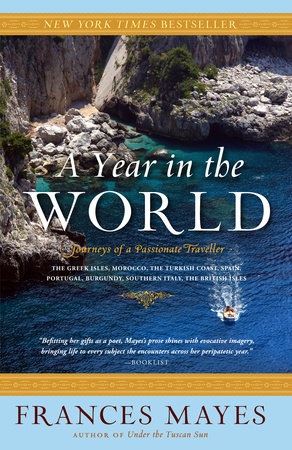A Year in the World Reader’s Guide
By Frances Mayes


1. Mayes opens her book with this quote from W.S. Merwin: “…we are words on a journey not the inscriptions of settled people.” Why do you think she has chosen this quote? What does it mean? When you read it how does it make you feel?
2. Throughout the book, Mayes talks about her lust for travel, using the German word Wanderjahr (their year of wandering in their youth). Do you think everyone should indulge in a year of youthful travel? Would it be better to experience this type of travel while young and impressionable, or at an older age, with more experience and wisdom?
3. Even though this is a book about travel, the concept of home is a consistent theme. Mayes writes, “The need to travel is a mysterious force. A desire to go runs through me equally with an intense desire to stay at home. An equal and opposite thermodynamic principal.” What does she mean by this? Deep down, do you consider Mayes to be a traveler or a homebody? Do both of these driving forces coexist within you? If so, how do you balance them?
4. Mayes describes Andalucía as an “ancient quest” for her because some of the music and poetry she enjoyed in her youth conjured up strong images of this place in her mind. So Andalucía is the first place she visits on her journey. Do you have a “first memory” of a place that you have never visited? Do you have preconceived notions about places, based on experiences or conversations you’ve had? Does a song, book, or poem “take you away” to a particular place?
5. While in Andalucía, Mayes falls prey to a scam. She is surprised but not outraged. Would she be so tolerant if this happened on her home turf? Have you ever made allowances for behaviors or attitudes while traveling that you would not normally have tolerated if you were at home?
6. Mayes describes herself as “a doubter” and yet she is fascinated by churches and other religious customs. She wears an ivory horn and other religious amulets under her skirt to ward off the “evil eye” and lights candles in Catholic churches for her sick friends. What do you make of this? Is Mayes a religious person deep down? How much do you think growing up in the American South has shaped her religious outlook? How has where you are from influenced your spiritual self?
7. Favoring to live like a local when she travels, Mayes makes obvious her disdain for tourists and how upsetting it is to her when a place is geared so obviously towards tourists. Isn’t Mayes herself a tourist? What makes someone a tourist? What makes someone a local?
8. Mayes talks about being driven to visit places by the books she reads. How do you decide where you’d like to travel?
9. Mayes says she fears retirement “in places where the climate is the lure.” What do you think she means by this? Would climate play an important role in your choice of where to retire? What other factors would play into your decision?
10. Naples has long been typecast as dangerous and corrupt. Mayes scoffs at these stereotypes. Have you ever felt discouraged to visit a place based on its bad reputation? Have you ever ignored a city’s bad reputation and visited there anyway? Did any of the stereotypes hold up? How did your preconceived notions about the place affect your experiences once there? Whose advice do you trust in choosing where to travel?
11. People love to buy souvenirs to help them remember a place they’ve visited. In Naples, Mayes buys a Neapolitan cookbook and her husband searches for a CD of local music. What do these purchases say about the buyers? What souvenirs have you purchased in the past that evoke special memories for you?
12. Mayes spends a lot of time describing food and drink. We hear in great detail about fabulous meals, Ed’s search for the perfect coffee, desserts that are unique to a certain location, and the wonderful marketplaces they encounter. Does experiencing the local cuisine enhance your visit to a particular place? Would you choose a lace to visit based entirely on the local fare?
13. Mayes and her husband choose many of their lodgings in order to more fully experience the local flavor. Some of the places they select turn out to be fairly undesirable–cold, cramped, sometimes even hazardous. When you travel, do you prefer to stay in a local dwelling or a touristy hotel? How much do your accommodations enhance or detract from your enjoyment of a particular place?
14. Why do you think Mayes chooses Georgia for the location of The Yellow Café? What did you think of her reaction when her daughter asked her about this? What do her answers and explanations tell us about Mayes and her ideas on home vs. Rome?
Just for joining you’ll get personalized recommendations on your dashboard daily and features only for members.
Find Out More Join Now Sign In